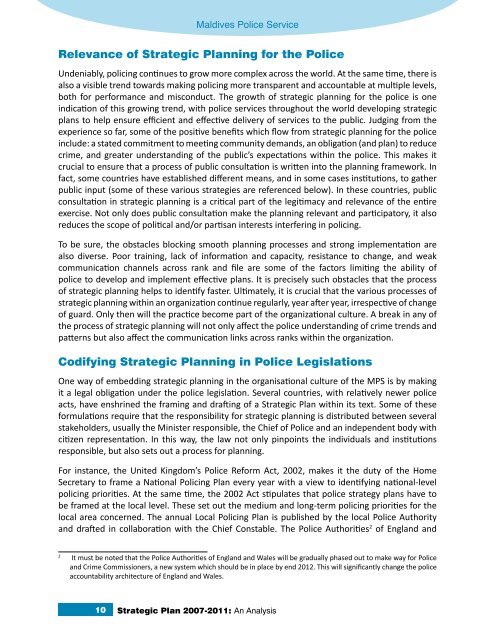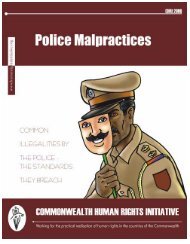Implementation of the Maldives Police Service Strategic Plan
Implementation of the Maldives Police Service Strategic Plan
Implementation of the Maldives Police Service Strategic Plan
Create successful ePaper yourself
Turn your PDF publications into a flip-book with our unique Google optimized e-Paper software.
<strong>Maldives</strong> <strong>Police</strong> <strong>Service</strong>Relevance <strong>of</strong> <strong>Strategic</strong> <strong>Plan</strong>ning for <strong>the</strong> <strong>Police</strong>Undeniably, policing continues to grow more complex across <strong>the</strong> world. At <strong>the</strong> same time, <strong>the</strong>re isalso a visible trend towards making policing more transparent and accountable at multiple levels,both for performance and misconduct. The growth <strong>of</strong> strategic planning for <strong>the</strong> police is oneindication <strong>of</strong> this growing trend, with police services throughout <strong>the</strong> world developing strategicplans to help ensure efficient and effective delivery <strong>of</strong> services to <strong>the</strong> public. Judging from <strong>the</strong>experience so far, some <strong>of</strong> <strong>the</strong> positive benefits which flow from strategic planning for <strong>the</strong> policeinclude: a stated commitment to meeting community demands, an obligation (and plan) to reducecrime, and greater understanding <strong>of</strong> <strong>the</strong> public’s expectations within <strong>the</strong> police. This makes itcrucial to ensure that a process <strong>of</strong> public consultation is written into <strong>the</strong> planning framework. Infact, some countries have established different means, and in some cases institutions, to ga<strong>the</strong>rpublic input (some <strong>of</strong> <strong>the</strong>se various strategies are referenced below). In <strong>the</strong>se countries, publicconsultation in strategic planning is a critical part <strong>of</strong> <strong>the</strong> legitimacy and relevance <strong>of</strong> <strong>the</strong> entireexercise. Not only does public consultation make <strong>the</strong> planning relevant and participatory, it alsoreduces <strong>the</strong> scope <strong>of</strong> political and/or partisan interests interfering in policing.To be sure, <strong>the</strong> obstacles blocking smooth planning processes and strong implementation arealso diverse. Poor training, lack <strong>of</strong> information and capacity, resistance to change, and weakcommunication channels across rank and file are some <strong>of</strong> <strong>the</strong> factors limiting <strong>the</strong> ability <strong>of</strong>police to develop and implement effective plans. It is precisely such obstacles that <strong>the</strong> process<strong>of</strong> strategic planning helps to identify faster. Ultimately, it is crucial that <strong>the</strong> various processes <strong>of</strong>strategic planning within an organization continue regularly, year after year, irrespective <strong>of</strong> change<strong>of</strong> guard. Only <strong>the</strong>n will <strong>the</strong> practice become part <strong>of</strong> <strong>the</strong> organizational culture. A break in any <strong>of</strong><strong>the</strong> process <strong>of</strong> strategic planning will not only affect <strong>the</strong> police understanding <strong>of</strong> crime trends andpatterns but also affect <strong>the</strong> communication links across ranks within <strong>the</strong> organization.Codifying <strong>Strategic</strong> <strong>Plan</strong>ning in <strong>Police</strong> LegislationsOne way <strong>of</strong> embedding strategic planning in <strong>the</strong> organisational culture <strong>of</strong> <strong>the</strong> MPS is by makingit a legal obligation under <strong>the</strong> police legislation. Several countries, with relatively newer policeacts, have enshrined <strong>the</strong> framing and drafting <strong>of</strong> a <strong>Strategic</strong> <strong>Plan</strong> within its text. Some <strong>of</strong> <strong>the</strong>seformulations require that <strong>the</strong> responsibility for strategic planning is distributed between severalstakeholders, usually <strong>the</strong> Minister responsible, <strong>the</strong> Chief <strong>of</strong> <strong>Police</strong> and an independent body withcitizen representation. In this way, <strong>the</strong> law not only pinpoints <strong>the</strong> individuals and institutionsresponsible, but also sets out a process for planning.For instance, <strong>the</strong> United Kingdom’s <strong>Police</strong> Reform Act, 2002, makes it <strong>the</strong> duty <strong>of</strong> <strong>the</strong> HomeSecretary to frame a National Policing <strong>Plan</strong> every year with a view to identifying national-levelpolicing priorities. At <strong>the</strong> same time, <strong>the</strong> 2002 Act stipulates that police strategy plans have tobe framed at <strong>the</strong> local level. These set out <strong>the</strong> medium and long-term policing priorities for <strong>the</strong>local area concerned. The annual Local Policing <strong>Plan</strong> is published by <strong>the</strong> local <strong>Police</strong> Authorityand drafted in collaboration with <strong>the</strong> Chief Constable. The <strong>Police</strong> Authorities 2 <strong>of</strong> England and2It must be noted that <strong>the</strong> <strong>Police</strong> Authorities <strong>of</strong> England and Wales will be gradually phased out to make way for <strong>Police</strong>and Crime Commissioners, a new system which should be in place by end 2012. This will significantly change <strong>the</strong> policeaccountability architecture <strong>of</strong> England and Wales.10<strong>Strategic</strong> <strong>Plan</strong> 2007-2011: An Analysis
















